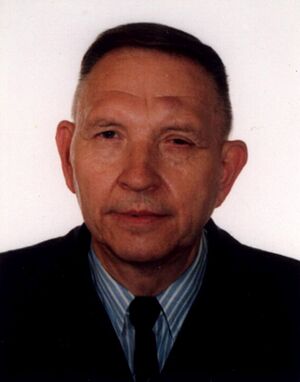Jerzy Gołos: Difference between revisions
Fiskfan1999 (talk | contribs) m categories |
Fiskfan1999 (talk | contribs) fix empty quotes |
||
| Line 3: | Line 3: | ||
== History == | == History == | ||
Gołos was born on 17 July, 1931. He lost hearing in one ear during the Warsaw Uprising. He would later become blind in one eye due to a botched cataracs operation. After WWII he moved to USA and studied Polish and Russian philosophy and musicology at Columbia University and City University of New York. After this, he recieved a scholarship to study the | Gołos was born on 17 July, 1931. He lost hearing in one ear during the Warsaw Uprising. He would later become blind in one eye due to a botched cataracs operation. After WWII he moved to USA and studied Polish and Russian philosophy and musicology at Columbia University and City University of New York. After this, he recieved a scholarship to study the ''Starowierców'' in Alaska and afterwards worked at the Research Center for Musical Iconography and was the editor of the RCMI/RIDIM bulletin from 1973-6. | ||
In 1972, Gołos published one of his most influential books, ''Polskie organy i muzyka organowa'' (a book which would later be translated into English with additional information{{Citation needed}}). Starting in 1969, he began a monumental inventory of historical organs in Poland with ''Ministerstwa Kultury i Sztuki'', a resource which proved to be valuable for others researching this topic. | In 1972, Gołos published one of his most influential books, ''Polskie organy i muzyka organowa'' (a book which would later be translated into English with additional information{{Citation needed}}). Starting in 1969, he began a monumental inventory of historical organs in Poland with ''Ministerstwa Kultury i Sztuki'', a resource which proved to be valuable for others researching this topic. | ||
Revision as of 21:30, 5 August 2023

Jerzy Gołos (1931-2019) was a Polish organist, musicologist, and editor. He has published countless scores and literature about Polish organ music, including Corpus of Early Keyboard Music vol. 10, including the first edition of the North-German organ works from the Pelplin Tablatures.
History
Gołos was born on 17 July, 1931. He lost hearing in one ear during the Warsaw Uprising. He would later become blind in one eye due to a botched cataracs operation. After WWII he moved to USA and studied Polish and Russian philosophy and musicology at Columbia University and City University of New York. After this, he recieved a scholarship to study the Starowierców in Alaska and afterwards worked at the Research Center for Musical Iconography and was the editor of the RCMI/RIDIM bulletin from 1973-6.
In 1972, Gołos published one of his most influential books, Polskie organy i muzyka organowa (a book which would later be translated into English with additional information[Citation needed]). Starting in 1969, he began a monumental inventory of historical organs in Poland with Ministerstwa Kultury i Sztuki, a resource which proved to be valuable for others researching this topic.
In the final part of his life, Gołos moved to Poland permanently. In 1996 he became a professor at Uniwersytecie Muzycznym Fryderyka Chopina, Warsaw. During this time he continued to generously assist students in their theses and fellow musicologists in Poland and USA ("w USA wielu muzykologów dotąd pamięta Jerry’ego Golosa!").
Throughout his life, Jerzy Gołos was described as "a warm and generous personality." He passed away on 10 February, 2019. Before this, he donated his piano to Muzeum Historii Przemysłu w Opatówku. He also donated his body to Uniwersytetowi Medycznemu, Warsaw, for the students to perform medical excercises.
References
jerzygolos.waw.pl, accessed 27 July, 2023.